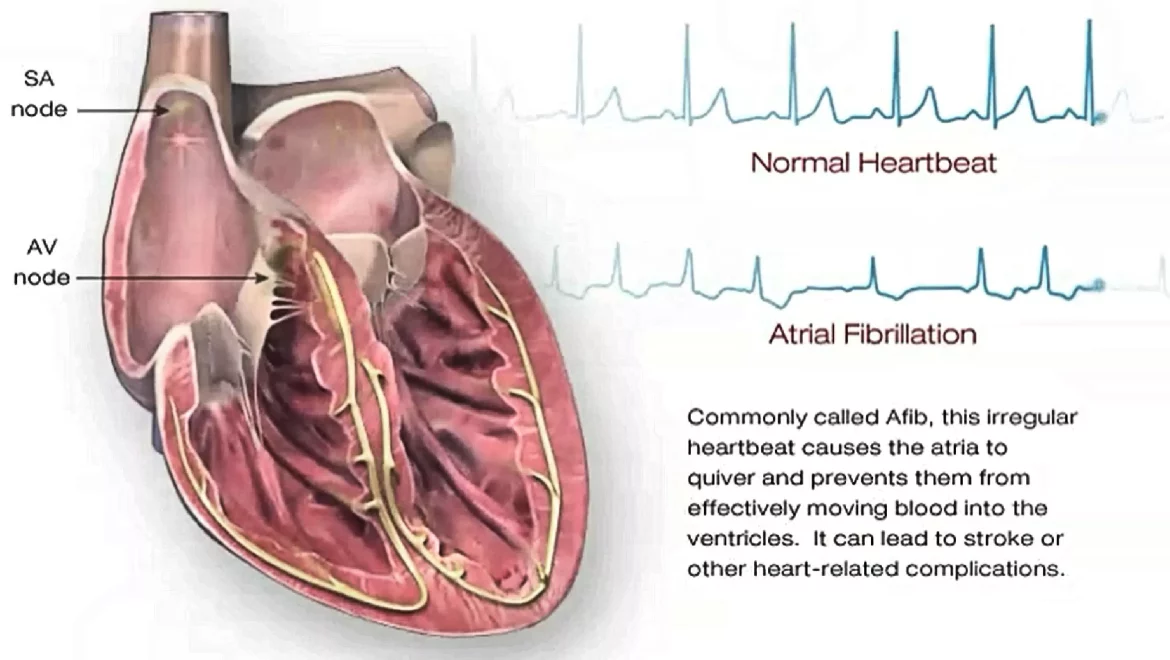Atrial fibrillation (AFib) is a common and serious heart condition characterized by an irregular and often rapid heartbeat.
This condition can lead to significant complications, including stroke, heart failure, and other heart-related issues. While there are various factors that can contribute to the development of AFib, one significant and often overlooked factor is alcohol consumption. In this article, we will explore five key reasons why drinking alcohol may cause atrial fibrillation.
5 Reasons Why Drinking Alcohol May Cause Atrial Fibrillation
1. Electrophysiological Changes
Alcohol consumption can cause electrophysiological changes in the heart, which can lead to atrial fibrillation. The heart relies on a precise electrical system to maintain its regular rhythm. When this system is disrupted, it can cause irregular heartbeats. Alcohol, particularly in large quantities, can interfere with the electrical signals in the heart, leading to AFib.
Mechanisms of Electrophysiological Disruption
Altered Ion Channel Function: Alcohol can affect the function of ion channels in heart cells, which are crucial for maintaining the heart’s electrical activity.
Increased Atrial Ectopy: Alcohol can increase the occurrence of premature atrial contractions, which can trigger atrial fibrillation.
Autonomic Nervous System Imbalance: Alcohol can affect the autonomic nervous system, leading to an imbalance that predisposes individuals to AFib.
Studies have shown that even moderate alcohol consumption can lead to significant changes in heart electrophysiology, increasing the risk of AFib. For instance, a study published in the Journal of the American College of Cardiology found that binge drinking can lead to immediate changes in heart rhythm, increasing the likelihood of AFib.
see also: What Are Factors Affecting Duration of Arrhythmia Symptoms
2. Structural Heart Changes
Chronic alcohol consumption can lead to structural changes in the heart, which can predispose individuals to atrial fibrillation. These structural changes include alterations in the size and function of the heart chambers, particularly the atria.
Types of Structural Changes
Atrial Enlargement: Long-term alcohol use can cause the atria to enlarge, making them more susceptible to fibrillation.
Fibrosis: Alcohol can promote the development of fibrosis, or scarring, in the heart tissue. This scarring disrupts the normal electrical pathways in the heart, increasing the risk of AFib.
Left Ventricular Dysfunction: Chronic alcohol use can impair the function of the left ventricle, the heart’s main pumping chamber. This can lead to increased pressure and stress on the atria, promoting AFib.
A study published in Circulation: Arrhythmia and Electrophysiology found that individuals with heavy alcohol consumption had a significantly higher prevalence of left atrial enlargement, a key risk factor for atrial fibrillation.
3. Inflammation and Oxidative Stress
Alcohol consumption can lead to increased inflammation and oxidative stress in the body, both of which are associated with the development of atrial fibrillation. Inflammation can damage heart tissue, while oxidative stress can lead to cellular injury and dysfunction.
Inflammatory Responses
Cytokine Production: Alcohol can stimulate the production of inflammatory cytokines, which can damage heart tissue and promote the development of AFib.
Endothelial Dysfunction: Alcohol-induced inflammation can impair the function of the endothelium, the inner lining of blood vessels. This can lead to increased blood pressure and stress on the heart, contributing to AFib.
Oxidative Stress
Reactive Oxygen Species (ROS): Alcohol metabolism produces reactive oxygen species, which can cause oxidative damage to heart cells and promote arrhythmias.
Antioxidant Depletion: Chronic alcohol consumption can deplete the body’s antioxidant defenses, making it more vulnerable to oxidative stress and its damaging effects.
Research published in the American Journal of Cardiology has shown that markers of inflammation and oxidative stress are elevated in individuals with atrial fibrillation, and these markers are further increased with alcohol consumption.
4. Electrolyte Imbalances
Alcohol can cause significant electrolyte imbalances in the body, which can disrupt the normal functioning of the heart and lead to atrial fibrillation. Electrolytes, such as potassium, magnesium, and calcium, are essential for maintaining the heart’s electrical stability.
Common Electrolyte Imbalances
Hypokalemia (Low Potassium): Alcohol can cause potassium levels to drop, leading to an increased risk of AFib.
Hypomagnesemia (Low Magnesium): Magnesium is critical for heart health, and alcohol can deplete magnesium levels, promoting arrhythmias.
Calcium Imbalance: Alcohol can also affect calcium levels, which are crucial for the contraction and relaxation of heart muscle cells.
A study in the journal Heart Rhythm found that patients with AFib often have lower levels of magnesium and potassium, and these deficiencies are more pronouned in those who consume alcohol regularly.
5. Alcohol-Induced Hypertension
Chronic alcohol consumption can lead to hypertension (high blood pressure), a major risk factor for atrial fibrillation.
Hypertension can cause changes in the heart and blood vessels that promote the development of AFib.
Effects of Alcohol on Blood Pressure
Acute Blood Pressure Increases: Even short-term alcohol consumption can cause temporary increases in blood pressure.
Chronic Hypertension: Long-term alcohol use can lead to sustained high blood pressure, which can cause structural and functional changes in the heart.
Increased Atrial Pressure: Hypertension increases the pressure in the atria, making them more susceptible to fibrillation.
The Framingham Heart Study, a landmark research project, found a strong correlation between alcohol consumption and the development of hypertension, which in turn was linked to an increased risk of atrial fibrillation.
Conclusion
Understanding the link between alcohol consumption and atrial fibrillation is crucial for both prevention and management of this serious heart condition. The electrophysiological changes, structural heart alterations, inflammation and oxidative stress, electrolyte imbalances, and alcohol-induced hypertension all contribute to the increased risk of AFib in individuals who consume alcohol. By being aware of these risks, individuals can make informed decisions about their alcohol consumption and take steps to protect their heart health. If you experience symptoms of atrial fibrillation, such as palpitations, shortness of breath, or fatigue, it is important to seek medical advice and consider lifestyle changes, including reducing alcohol intake, to manage the condition effectively.

